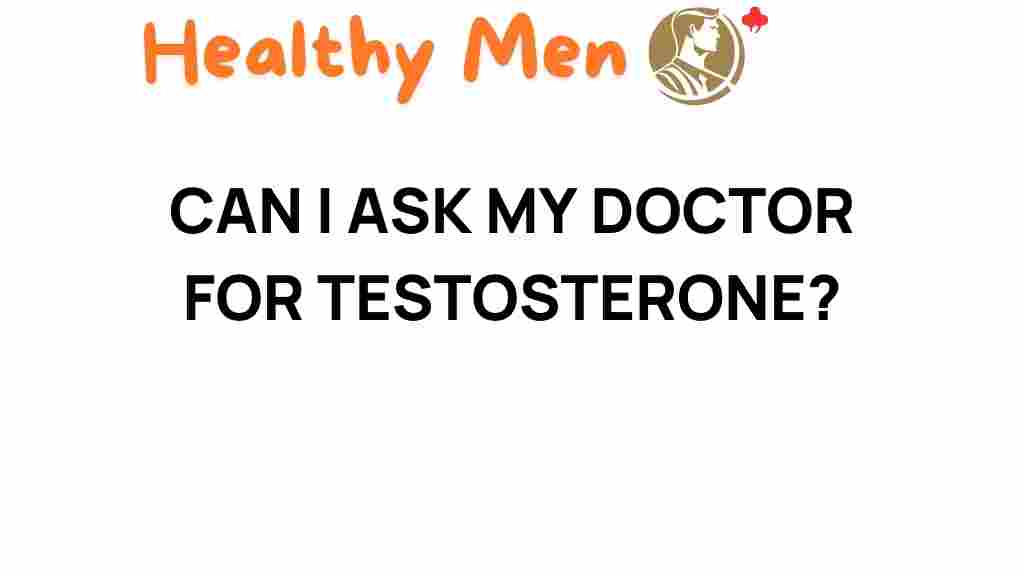The Testosterone Talk: Should You Consult Your Doctor?
Testosterone is a vital hormone that plays a significant role in men’s health and overall wellness. As men age, their testosterone levels naturally decline, leading to various symptoms that may impact their quality of life. If you’re experiencing changes in your health, energy levels, or mood, it might be time to consider whether a consultation with your doctor about testosterone is necessary. This article will guide you through understanding testosterone, recognizing symptoms of low levels, and exploring potential treatments available through hormone therapy.
Understanding Testosterone and Its Role in Men’s Health
Testosterone is primarily produced in the testicles and is responsible for many functions in the male body, including:
- Regulating libido (sex drive)
- Supporting sperm production
- Maintaining muscle mass and strength
- Promoting bone density
- Influencing mood and cognitive functions
As men reach their 30s and beyond, testosterone levels can begin to decline, a condition often referred to as testosterone deficiency or hypogonadism. Understanding the implications of low testosterone is essential for maintaining health and wellness.
Recognizing Symptoms of Low Testosterone
Low testosterone levels can manifest in various symptoms, including:
- Fatigue or decreased energy levels
- Reduced libido or sexual dysfunction
- Loss of muscle mass or strength
- Increased body fat
- Depression or mood changes
- Difficulty concentrating or memory issues
- Hot flashes or night sweats
If you are experiencing one or more of these symptoms, it may be beneficial to consult your doctor for a thorough evaluation of your testosterone levels and overall health.
When to Consult Your Doctor About Testosterone
Deciding to consult your doctor about testosterone should be based on the presence of symptoms and concerns regarding your health. Here’s a step-by-step process to help you determine when to seek professional advice:
- Assess Your Symptoms: Keep track of any physical or emotional changes you’ve noticed. Consider how long these symptoms have persisted.
- Research Your Family History: If you have a family history of hormonal issues or related health concerns, it may be worthwhile to discuss this with your doctor.
- Prepare for Your Appointment: Write down your symptoms, any medications you’re taking, and questions you may have about testosterone and health.
- Schedule a Consultation: Make an appointment with your healthcare provider to discuss your concerns and undergo any necessary testing.
The Importance of a Medical Consultation
Consulting your doctor about testosterone is crucial for several reasons:
- Accurate Diagnosis: Symptoms associated with low testosterone can overlap with other health issues. A doctor can provide a comprehensive evaluation to determine the root cause.
- Proper Testing: Your doctor may recommend blood tests to measure your testosterone levels and other related hormones.
- Evaluate Overall Health: A consultation allows your doctor to assess your general health, including any underlying conditions that may affect testosterone levels.
- Discuss Treatment Options: If low testosterone is diagnosed, your doctor can explain various treatment options available, including hormone therapy.
Hormone Therapy: Treatments Available
If you and your doctor determine that hormone therapy is appropriate for you, there are several treatment options available:
- Testosterone Injections: Administered directly into the muscle, these injections are typically given every 1 to 2 weeks.
- Testosterone Patches: These are worn on the skin and release testosterone into the bloodstream over time.
- Testosterone Gels: Applied daily to the skin, these gels are absorbed into the bloodstream.
- Pellets: Small pellets containing testosterone can be implanted under the skin and release the hormone gradually.
Each treatment option has its pros and cons, and it’s essential to discuss these thoroughly with your doctor to choose the best one for your needs.
Potential Risks and Considerations of Hormone Therapy
While hormone therapy can be beneficial, it also comes with potential risks and side effects:
- Increased risk of heart disease
- Potential for sleep apnea
- Skin reactions or irritation at injection sites
- Changes in mood or behavior
It’s crucial to have an open dialogue with your doctor about these risks and to have regular follow-up appointments to monitor your health during treatment.
Alternative Approaches to Boost Testosterone Levels
Aside from hormone therapy, there are lifestyle changes and natural treatments that can help improve testosterone levels:
- Exercise Regularly: Engaging in strength training and high-intensity interval training (HIIT) can naturally boost testosterone levels.
- Maintain a Healthy Weight: Obesity is linked to lower testosterone levels, so maintaining a healthy weight is vital for hormonal balance.
- Eat a Balanced Diet: Consuming a diet rich in whole foods, healthy fats, and lean proteins can support hormone production.
- Manage Stress: High stress levels can lead to elevated cortisol, which negatively impacts testosterone. Practice stress management techniques like meditation or yoga.
- Get Adequate Sleep: Quality sleep is essential for hormone production. Aim for 7-9 hours of sleep per night.
Conclusion: The Importance of a Testosterone Consultation
In conclusion, if you are experiencing symptoms associated with low testosterone, consulting your doctor is a crucial step toward understanding your health. Through proper evaluation and testing, you can determine if hormone therapy is right for you and explore various treatment options that can enhance your quality of life. Remember, maintaining your health and wellness is a lifelong journey, and being proactive about your testosterone levels is an essential part of that process.
For more information about testosterone and men’s health, consider visiting Men’s Health Network for resources and support.
For a deeper dive into hormone therapy and its effects, you can check out this comprehensive guide.
This article is in the category Conditions and created by healthymen Team
